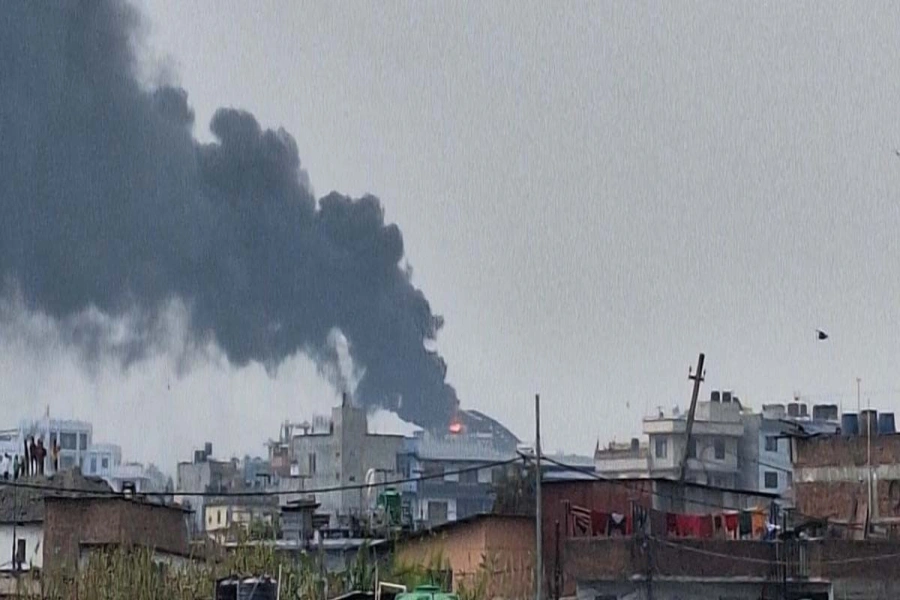If not regulated urgently, the adulterated Ayurvedic medicines will increasingly become a potential source of lead intoxication in Nepal.
An adult man with low sperm count was prescribed some seven types of Ayurvedic medicines by a licensed Ayurvedic practitioner in Kathmandu. After consuming those medicines for three months, the man, instead of getting any better, developed even more serious health complications such as tiredness, decreased appetite, nausea and severe abdominal pain, with no improvement in his reproductive problem.
He did not have any history of any significant medical or surgical experience, besides the fact that he had taken the prescribed Ayurvedic medications for three months to increase his sperm count.
When the abdominal pain did not subside even for two days and became ‘more and more unbearable’, he rushed to four different hospitals for treatment. Initial investigations could not reveal the actual cause of his new illnesses. His CT scans and ultrasound reports were normal. And his vital signs were stable. On physical examination, no signs of peritonitis were observed. Physical examination was remarkable for abdominal tenderness in the epigastric area. Testicular examination and per rectal examination reports were normal. However, laboratory evaluation revealed a hemoglobin level of 9.7 g/dL—a sign of anemia with a mean corpuscular volume (MCV) of 87.1 fL and a reticulocyte count of 3.8 percent.
Based on the relation between anemia and abdominal pain, a doctor suspected that it could be a case of lead poisoning. So, the doctor asked him to test his blood for Blood Lead Level (BLL) at Samyak Diagnostic Pvt Ltd, Jawlakhel, the only BLL referral center in Nepal. His BLL reading was extremely high—82.3 µg/dL. He required immediate hospitalization and chelation therapy as per the results published in an international journal named The Journal of the International Federation of Clinical Chemistry and Laboratory Medicine (2020).
Ban on hemp creates problem in manufacturing of 21 Ayurvedic me...

The patient’s history showed no other potential sources of lead exposure than the intake of some Ayurvedic medicine. Upon investigation, it was found that he was consuming seven different kinds of Ayurvedic medicines. After knowing this, the doctor asked him to purchase the same Ayurvedic medicines. Those Ayurvedic medicines were sent to a lab for lead contamination tests and were found to be highly contaminated with lead and not fit for consumption.
The World Health Organization has prescribed a limit for lead contents in herbal medicine at 10 ppm. However, the test results showed six Ayurvedic medicines out of seven that patient was using had higher lead concentration ranging from 4.53 ppm to 209.7 ppm. The Ayurvedic medicine named Vanga Bhasma which the patient was using contained the highest amount of lead (209.7 ppm) out of these six Ayurvedic medicines, when analyzed through the Atomic Absorption Spectrophotometer (AAS).
Based on the lab test reports, the doctor concluded that the Ayurvedic medicines he had been using were the sole reasons behind his acute lead toxicity. He was asked to immediately stop consuming the Ayurvedic medicines and undergo chelation therapy with D-Penicillamine. It was beneficial in reducing his BLL and his abdominal pain also improved.
This is just one case of Acute Lead Toxicity in Nepal associated with Ayurvedic medicines, among the many unknown and not reported cases, calling for an urgent need for regulation. If not regulated urgently, these adulterated Ayurvedic medicines will increasingly become a potential source of lead intoxication in Nepal.
Legal requirements
The Department of Drug Administration (DDA) under the Ministry of Health and Population (MoHP) is the major authorized regulatory body to control the production, sale, distribution, export, import, storage and consumption of the drugs which are not safe for consumption and which are not efficacious and of standard quality as per the Drugs Act 1978. The Department of Ayurveda and Alternative Medicine (DoAA)—one of the three departments of the MoHP—is responsible for programming, management of information and supervision, monitoring and evaluation of delivery of Ayurveda service and promote healthy life style through its networks and facilities all across the country.
As per the Drugs Act, any drug manufacturing industry should, prior to the sale and distribution of each drug manufactured by it, register the drug with the DDA, as prescribed, and obtain the drug registration certificate, by paying the prescribed fees. The Act has a further provision for any person intending to import a drug to get each such drug of a licensed company registered with the DDA, as prescribed, and obtain the registration license, by paying the prescribed fees. There has been also a provision of obtaining the export or import license pursuant to the prevailing law.
The Drugs Act further requires each drug to be safe for public consumption, efficacious and of quality standard in such a manner as to maintain the prescribed quality standard. Furthermore, no person can manufacture, sell, distribute, export, import, store, or cause to do the same or cause the consumption of a drug which is not safe for public consumption, efficacious and of quality standard.
The Act also has a provision for the return of a drug which is not safe for public consumption and is not efficacious and of quality standard. If a drug which has already been marketed for sale and distribution is not safe for public consumption, efficacious and of quality standard pursuant to Section 12 of the Act, the manufacturer or his/her agent must get back such drugs from the seller or distributor. Similarly, if it comes to the knowledge of the administrator in any manner that a drug which is not safe for public consumption and is not efficacious and of quality has been marketed for sale and distribution, he/she may make the seller or distributor of the drug return it to its manufacturer.
If a drug manufactured in such a manner that it is not safe for public consumption and is not efficacious and of quality standard results in the death of, or causes injury to the health of any person, the drug manufacturer shall be responsible for it and provide compensation, as prescribed, to the successor to the deceased for such death and to that person in the event of such injury.
What should be done?
A very high level of toxic lead has been found in numerous Ayurvedic medicines prescribed by licensed Ayurvedic practitioners in Nepal. Additionally, there are numerous cases of very high levels of BLL among the patients consuming prescribed Ayurvedic medicines that go unreported in Nepal.
There are very clear provisions for the steps to be taken to find out whether any drug is safe for consumption and everyone would expect prompt action from the government agencies concerned such as the MoHP, DDA, DoAA, Nepal Ayurvedic Medical Council (NAMC) and professional associations like Civil Ayurveda Doctors Association of Nepal (CADAN), Ayurveda Doctors Association of Nepal (ADAN), Nepal Ayurveda Professionals Society (NAPS) etc. They should come forward and urgently address the issues related to Ayurvedic prescriptions becoming an increased source of heavy metal intoxication in Nepal. No medicine should be allowed to become a source of health damage and heavy metal intoxication in Nepal.
Therefore, Ayurvedic medicine sector should be effectively regulated by all concerned, especially by the DDA and MoHP.
Action must be taken against the manufacturers of contaminated Ayurvedic medicines and provisions for testing the contamination of all possible heavy metals (lead, cadmium, nickel, chromium, mercury etc) in all Ayurvedic medicine should be effectively implemented along with the formulation of the required Act, Regulations and Standards with their effective implementation mechanism in place.
Further investigation into heavy metal intoxication in patients using Ayurvedic medicines needs to be started immediately. The results of tests for heavy metals and patient intoxication with heavy metals need to be made public and massive public awareness programs on the same should be launched countrywide.







-1200x560-1772467693.webp)





























